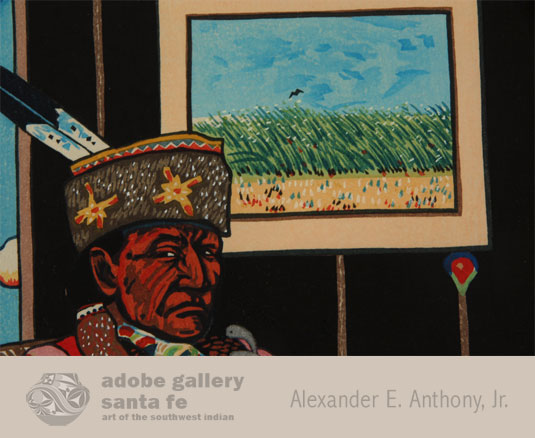Original Woodcut Collector #5 [SOLD]
+ Add to my watchlist Forward to Friend
- Category: Original Prints
- Origin: Kiowa Nation
- Medium: woodcut
- Size:
17-1/2” x 14-3/4” image;
25” x 20” paper;
30-1/8” x 24-5/8” framed - Item # 25925 SOLD
T. C. Cannon’s father, Walter, said that T. C. entered artwork in contests when he was 14 or 15 years old and won awards four years in a row. He said that even at that age, his art was different from that of other Native artists. Walter described it as modern art. After high school, T. C. attended the Institute of American Indian Arts in Santa Fe and the Art Institute in San Francisco. In 1967, he enlisted in the U. S. Army. After he was discharged, T. C. moved to Santa Fe and resumed his art career. In 1967, at the age of 22, he shared a two-man show with Fritz Scholder at the Smithsonian in Washington, D. C. From there, he amassed an amazing list of one-man exhibits all over the country.
In 1972, the owners of Aberbach Fine Art in New York met T. C. at the exhibit at the Smithsonian. They were impressed by the 24-year-old artist’s talent and purchased all of the paintings in the exhibit. They arranged with him to be his sole representatives for the entire world.
In 1975, T. C. Cannon began a collaboration with Japanese master woodcutter Maeda and master printer Uchikawa, a collaboration that continued until Cannon’s untimely death in 1978. The result was the publication of the Memorial Woodcut Suite. In 1978, Cannon traveled to New York to sign the first two of the completed Japanese woodcuts. He returned to Santa Fe and died in an automobile accident on May 8th. Cannon’s father, Walter, signed the remaining woodcut prints for his son.
T. C. Cannon (1946-1978) Pai-doung-u-day "One Who Stands In The Sun" had completed the following woodcuts with his Japanese collaborators:
Collector #5 (signed by T. C. Cannon)
His Hair Flows Like a River (signed by Walter Cannon)
Two Guns Arikara (signed by Walter Cannon)
Hopi with Manta (signed by T. C. Cannon)
Woman at Window (signed by Walter Cannon)
Dandy (signed by Walter Cannon)
Tosca (signed by Walter Cannon)
Collector #5 stands as a hallmark of T. C. Cannon’s style of art. He has presented the single Indian man fully dressed in traditional clothes but, beyond that, everything else seems non-Indian. He has presented an Indian in a non-Indian world. He sits in a white wicker chair and displays a frown on his face. Is he sad, angry, moody? It appears that his legs are crossed, but it has been noted that he is in the process of crossing his leg. That process is not complete. That is probably a trick played by Cannon to see if the viewer catches the intent.
A description of Collector #5, written by William Benton and published in Southwest Art, June 1981, states:
An Indian in a beautiful white wicker chair. He wears a fur hat with a single feather in it, cocked at an angle. Legs crossed. His stare is defiant, stern. A hint of posed gruffness. He is dressed fit to kill. A paisley scarf dwarfed by a necklace of bear claws and feathers. A bright purple shirt with orange polka dots, aquamarine vest, blue and white trousers with red stripes. Red and white moccasins: pink socks. He sits in an interior. There is a Navajo rug beneath the wicker chair. On the wall behind him hangs a reproduction of Van Gogh’s “Wheatfield.” The wall seems to be a construction of tarpaper and two-by-fours studded with shiny metal hearts. Perhaps it is wallpaper. There are two windows which look out on dry hills and small clouds. A border of gold containing red and green mica-flake shapes frames the edge of the picture.
![]() Collector #5 was issued in an edition of 200 copies. This is #63/200. It was signed on lower left by the artist. The image has been framed to expose the entire paper. All materials are archival. A wood silver frame was chosen.
Collector #5 was issued in an edition of 200 copies. This is #63/200. It was signed on lower left by the artist. The image has been framed to expose the entire paper. All materials are archival. A wood silver frame was chosen.
Following Cannon’s death, Aberbach Fine Art put together a Memorial Exhibit in December 1979. They published a book to accompany the exhibit (see Recommended Reading below).
Joan Frederick, the author of T. C. Cannon: He Stood in the Sun, notified us of the correct tribal affiliation of the artist. His mother had registered him as a Caddo when he was born but when he turned 18 he chose to register as Kiowa, since his father was half-Kiowa and since he had been raised among the Kiowas and considered them his primary relatives.
Condition: very good condition
Provenance: from the personal collection of artist Amado Pena
Reference and Recommended Reading: T. C. Cannon Memorial Exhibit December 1979 by Aberbach Fine Art, New York. Hard cover, 154 pages. Photographs of the artist and his work.

- Category: Original Prints
- Origin: Kiowa Nation
- Medium: woodcut
- Size:
17-1/2” x 14-3/4” image;
25” x 20” paper;
30-1/8” x 24-5/8” framed - Item # 25925 SOLD



